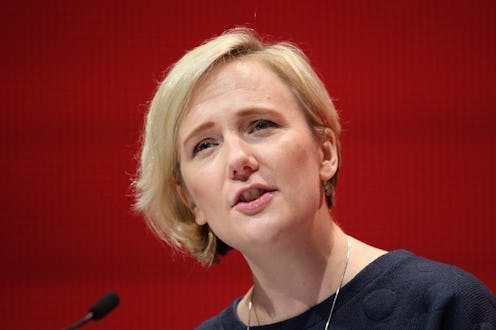News
Why Labour MP Stella Creasy Feels She Has To Choose Between Her Job & Being A Mum

Working and motherhood have frustratingly always been difficult to balance in most industries. And now, MPs maternity rights are the latest to come under scrutiny. Stella Creasy, MP for Walthamstow, who is currently pregnant, is speaking out about the hardships she and others have had to face when it comes to reproductive rights, pregnancy discrimination, and working as an MP.
"I never thought parliament would tell me to choose between being an MP and being a mum," she wrote in an honest and heartfelt article in the Guardian. In the piece, Creasy opened up about the traumatic experience of having two miscarriages where she was "aching and bleeding", yet still had to work and lead a public meeting, something nobody should have to do.
Now pregnant, Stella Creasy expressed that The Independent Parliamentary Standards Authority (ISPA), the body in charge of regulating MP's pay, turned down her request for paid cover during maternity leave. She explained that the ISPA, "does not “recognise” that MPs go on maternity leave. Thus, it feels no responsibility to make provision for any paid cover for what we do outside the parliamentary chamber: the campaigns, constituency casework and municipal work that all MPs do."
The government states that any pregnant person is eligible for Statutory Maternity Leave as long as they an employee not a "worker" and give their employee advance notice. And for Statutory Maternity Pay, you can receive 90% of your average weekly earnings for the first 6 weeks and 90% of your average weekly earnings for the next 33 weeks. Yet for some MPs, they could continue performing work duties right up until the birth of their child.
Shockingly, fellow Labour MP Tulip Siddiq was denied a proxy for a recent vote on Theresa May's Brexit deal back in January meaning, as The Guardian reports she had to postpone her C-section and attend in person in a wheelchair. She then returned to casework three days after the surgery. According to the Evening Standard, due in part to a rightful outcry, she became the first person in history to vote by proxy, meaning someone else can vote in your place. This has lead to government introducing a year long pilot for proxy voting in the cases of maternity, paternity, and adoption.
Sadly, Creasy thinks what has happened to her and others may be a deterrent for women wanting to become MPs. According to the Guardian, women made up only 32% of total elected representatives in 2018. Speaking on BBC Radio 4's Today programme, she said, "It doesn't seem right that communities should be penalised for having a woman as its MP. We're giving people another reason not to appoint women to the House of Commons."
Nobody should expect to go through what Creasy, Siddiq, and other MPs have had to go through. It's 2019, people shouldn't still have to be choosing between career or a family. Constituencies shouldn't have to suffer, nor should MPs be forced to spend less time with their families. The stress and trauma under which MPs carrying children are expected to continue to work illustrates just how much still has to be done in regards to pregnancy discrimination.